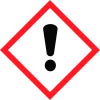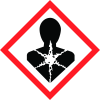3M Scotch-Weld PUR Adhesive TE200
3m company
Revision date : 2021-12-10


Note: Ingredients listed on restricted chemical lists
EC/CAS
101-68-8
Name of the chemical
4,4’-Methylenediphenyl diisocyanate
Concentration
N/A
EC/CAS
202-966-0
Name of the chemical
4,4’-Methylenediphenyl diisocyanate
Concentration
N/A
General Information
Revision date
2021-12-10
Product name
3M Scotch-Weld PUR Adhesive TE200
Emergency telephone
+44 (0)1344 858 000
Icons in SDS
Company Information
Company name
3m company
E-mail address of the competent person responsible for the Safety Data Sheet
tox.uk@mmm.com
GHS Information
Signal word
Danger
Hazard Codes
Hazard statements (CLP)
H317, H334, H351
Hazard statements
Code
Statements
H317
May cause an allergic skin reaction
H334
May cause allergy or asthma symptoms or breathing difficulties if inhaled
H351
Suspected of causing cancer
Precautionary statements
Code
Statements
P280
Wear protective gloves/protective clothing/eye protection/face protection.
P304+P340
IF INHALED: Remove person to fresh air and keep comfortable for breathing.
P333+P313
IF SKIN irritation or rash occurs: Get medical advice/attention.
P342+P311
IF experiencing respiratory symptoms: Call a POISON CENTER/doctor/...
Section 2
2.1 Classification of the substance or mixture
CLP REGULATION (EC) No 1272/2008 The health and environmental classifications of this material have been derived using the calculation method, except in cases where test data are available or the physical form impacts classification. Classification(s) based on test data or physical form are noted below, if applicable. Respiratory Sensitization, Category 1 - Resp. Sens. 1; H334 Skin Sensitization, Category 1 - Skin Sens. 1; H317 Carcinogenicity, Category 2 - Carc. 2; H351 For full text of H phrases, see Section 16.
2.2 Label elements
CLP REGULATION (EC) No 1272/2008
Hazard pictograms
GHS08 (Health Hazard) | Ingredients: Ingredient CAS Nbr EC No. % by Wt 4,4'-methylenediphenyl diisocyanate 101-68-8 202-966-0 <= 3
Hazard statements
H334 May cause allergy or asthma symptoms or breathing difficulties if inhaled. H317 May cause an allergic skin reaction. H351 Suspected of causing cancer.
Prevention
P261A Avoid breathing vapours. P280E Wear protective gloves.
Response
P304 + P340 IF INHALED: Remove person to fresh air and keep comfortable for breathing. P333 + P313 If skin irritation or rash occurs: Get medical advice/attention. P342 + P311 If experiencing respiratory symptoms: Call a POISON CENTRE or doctor/physician. Information required per Regulation (EU) 2020/1149 as regards diisocyanates: As from 24 August 2023 adequate training is required before industrial or professional use. Further information can be found at feica.eu/Puinfo
2.3 Other hazards
Persons previously sensitised to isocyanates may develop a cross-sensitisation reaction to other isocyanates. May cause thermal burns.

